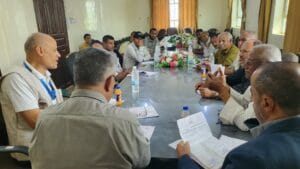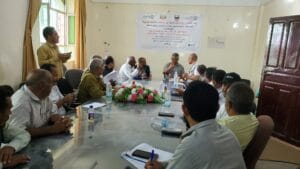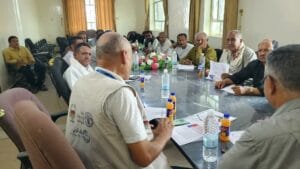Al-Dhale’e Governorate hosted today the first coordination meeting for the launch of the Emergency Response, Food Security, and Resilience Project in Yemen – Al-Dhale’e Governorate, implemented by the Food and Agriculture Organization of the United Nations (FAO) in partnership with Bena Charity for Human Development (BCFHD) and funded by the World Bank.
At the outset of the meeting, Dr. Faisal Al-Sabri, the Project Manager, delivered a brief presentation on the nature of the interventions and the household targeting criteria, commending the cooperation of local authorities in facilitating the implementation of project activities and achieving the desired impact.
The meeting was attended by several key local officials, including the Directors of Agriculture, Planning, and Social Affairs Offices in the governorate, as well as representatives of local councils in the targeted districts and the Directors of Agriculture Offices in Al-Dhale’e, Al-Azariq, Al-Husain, and Juhaf.
In his remarks, Dr. Nabil Al-Afif, Director of the Planning Office, praised the efforts of Benaa Charity for their role in implementing such impactful interventions that support agricultural activities and enhance food security for vulnerable families in Al-Dhale’e Governorate. He emphasized the importance of joint efforts among partners to ensure the sustainability of project outcomes.
During the meeting, Memorandums of Understanding (MoUs) were signed with the relevant authorities at both governorate and district levels to ensure effective coordination throughout the project implementation stages.
The project targets the districts of Al-Dhale’e, Al-Azariq, Al-Husain, and Juhaf, aiming to improve food security and nutrition for 1,800 vulnerable households with children under the age of five suffering from malnutrition. Support will be provided through home gardening activities, including drip irrigation systems, water tanks, hand farming tools, and five types of seeds (tomatoes, chili peppers, coriander, molokhia, and onions). The project will also supply cooking and food processing tools, and deliver training on good agricultural practices, installation and maintenance of irrigation systems, and nutrition awareness.
The project directly contributes to strengthening the resilience of rural communities and improving the livelihoods of households affected by ongoing humanitarian and economic challenges, reflecting a strategic approach to promoting food security and sustainable agriculture in Al-Dhale’e Governorate.







